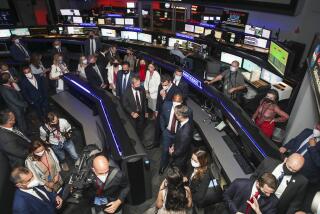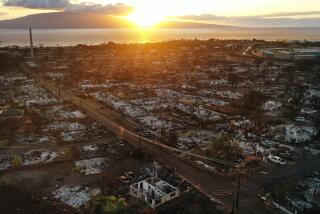Amazon.com founder Jeff Bezos invests in space travel
SEATTLE — Amazon.com founder and Chief Executive Jeff Bezos is putting a chunk of his fortune — estimated at $18 billion — toward more out-of-the-box ventures.
He created a private aerospace company called Blue Origin in 2000 with an aim to make space travel more affordable, and he’s spending millions to build a clock that’s supposed to last 10,000 years in the desert wilderness of West Texas.
Since 2010, NASA has committed nearly $26 million for Kent, Wash.-based Blue Origin, which is competing with Boeing and two other companies to create a new generation of vehicles that can take U.S. astronauts to the international space station.
“My passion is for space, for sure, but I do think this can be made into a viable business,” Bezos said in a 2007 TV interview with PBS’ Charlie Rose. “You have to be very long-term oriented.”
His interest in space goes way back. As high school valedictorian, Bezos aspired to develop space hotels, amusement parks and colonies for 2 million or 3 million people orbiting the Earth.
“He was not optimistic about what we were doing to our planet, and this was before global warming was a big issue,” said his girlfriend at the time, Ursula Werner, now a writer living in Washington, D.C. “He was also really intrigued by the idea of rocketing into outer space.”
Last summer, Blue Origin suffered a setback when an unmanned test rocket exploded over the West Texas desert. Only after a report in the Wall Street Journal, which said the mishap “dealt a potentially major blow” to Bezos’ space plans, did he confirm the test failure.
In a short note on Blue Origin’s website, Bezos said that while it was “not the outcome any of us wanted,” he had “signed up for this to be hard.”
Bezos revealed last week that a privately funded team of “undersea pros” had found the huge engines that helped launch the Apollo 11 mission to the moon in 1969. Bezos, who plans to recover the engines from the Atlantic Ocean and return them to NASA, said he hopes one will go to the Museum of Flight in Seattle.
Bezos also is spending $42 million on a 10,000-year clock — an actual clock meant to run for 10 millennia inside a mountain in West Texas — to encourage people to be less shortsighted and to focus on the long-term. Even if it means being misunderstood.
“If you take the long view,” he said last year to Wired magazine, “you can solve problems you can’t solve any other way.”
Martinez writes for the Seattle Times/McClatchy.
David Turim contributed to this report.






